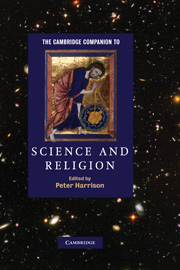Introduction
Published online by Cambridge University Press: 28 July 2010
Summary
In 1939 the eminent Cambridge philosopher C. D. Broad observed that discussions of the relations between religion and science among his contemporaries had 'acquired something of the repulsiveness of half-cold mutton in half-congealed gravy'. Fortunately for readers of this volume much has changed in the years since Broad offered this droll assessment and it is safe to say that the field of science and religion now offers a much more appetizing prospect. There are several reasons for the renewed vigour of discussions about science and religion. Developments in the sciences themselves have played a key role. In cosmology, the rise to prominence of Big Bang theory has led to speculations about how the temporal origins of the universe might be linked with the idea of creation. Related to this, the surprising fact that our universe seems remarkably fine-tuned for the emergence of intelligent life has, for some commentators at least, breathed new life into what had once been regarded as moribund arguments from design. Fine-tuning arguments have also found their way into chemistry and biology, raising intriguing questions about purpose, teleology and their place in the sciences. The profoundly mysterious quantum world continues to challenge commonsense understandings of matter and causation, inspiring religious and philosophical speculations about divine action and free will and, more generally, about the nature of reality itself.
- Type
- Chapter
- Information
- The Cambridge Companion to Science and Religion , pp. 1 - 18Publisher: Cambridge University PressPrint publication year: 2010
- 1
- Cited by



